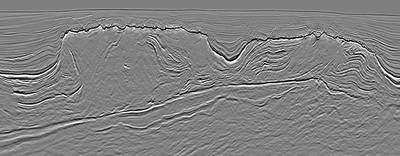CGG has been present in Brazil for over 55 years, since the company began working
with Petrobras in 1961. Its long-established Rio de Janeiro Subsurface Imaging Center, with its strong reservoir characterization group, has the largest computer capacity and greatest expertise in the region. In 2010, CGG also opened a technology center in Rio with a world-class R&D team, working with Petrobras and other local agencies to focus on solving local geoscience challenges. The company’s commitment to Brazil is demonstrated by its investment in over 170,000 km2 of 3D multi-client seismic data offshore, which it continues to upgrade and increase.
Currently, CGG is spending considerable time and effort in the pre-salt area, reprocessing its conventional 3D surveys with the latest technology, including 3D deghosted
broadband processing and TTI (tilted transverse isotropy) FWI (full-waveform inversion) velocity model building, to upgrade them with its latest processing and imaging advances. It is also acquiring new BroadSeis™ surveys to fill the gaps and create a contiguous volume of over 80,000 km2 of state-of-the-art seismic data, bridging the Santos and Campos Basins to cover the entire pre-salt area.
The first stage of this reprocessing, the Galaxy project covering approximately 34,000 km², delivered grids of 3D migrated images, extracted from CGG’s Cluster and Cluster Extension surveys, for a quick evaluation of the Santos Basin in advance of the licensing rounds.
This was a precursor to the ongoing 23,750-km2 Constellation project, which will apply improvements in subsurface imaging achieved over the past decade to these legacy data sets and bring new insight into the Lula, Peroba and Pau Brasil fields.
Further up the coast CGG is reprocessing the Santos VI-A, VI-B, and Campos II surveys as the Pulsar project. Although these surveys are relatively recent, advances in FWI velocity modeling and the benefits of a consistent, contiguous data volume led to them being included in the reprocessing effort. This complies with CGG’s policy of applying the most advanced technology to its multi-client data.
CGG also recently acquired the 15,700-km2 Santos VII BroadSeis survey, which will be seamlessly merged with Constellation and Pulsar to complete the picture from the Pau Brasil to Saturno fields and beyond, including Tres Marias. The fast-track volume over Saturno has already been delivered.
As a geoscience company, CGG also provides multi-client gravity and magnetic data for Brazil in addition to seismic. Its NPA Satellite Mapping Seep Explorer database provides details of all the naturally occurring seeps for the entire coast of Brazil. Its Robertson geoscience experts have conducted several in-depth geological studies, including a review of the tectonostratigraphic development and source rock distribution in the Santos and Campos Basins. It is also currently undertaking a JumpStart™ program, integrating all this data and the available wells, to complement the 80,000-km2 seismic volume and deliver from one place all the information needed for a comprehensive understanding of the petroleum systems in the pre-salt area.
CGG also provides coverage of other significant basins
offshore Brazil. Its recently completed Megabar pre-stack depth-migrated data set in the Barreirinhas Basin is part of its extensive Equatorial Margins coverage, where it is also working on another JumpStart program. Its newest 3D survey is the 10,300-km² Espirito Santo IV, which commenced acquisition in July.
It is a very exciting time for CGG offshore Brazil, as decades of hard work come to fruition. For over half a century it has been building up its expertise in the region, using its latest worldwide technology and customizing it for Brazil. This enables it to minimize customer risk by providing the finest subsurface images, enhanced with geological data, studies and services, to maximize understanding of the petroleum systems and prospectivity.
CGG continually seeks new opportunities in Brazil and has a number of permits currently awaiting regulatory approval.












